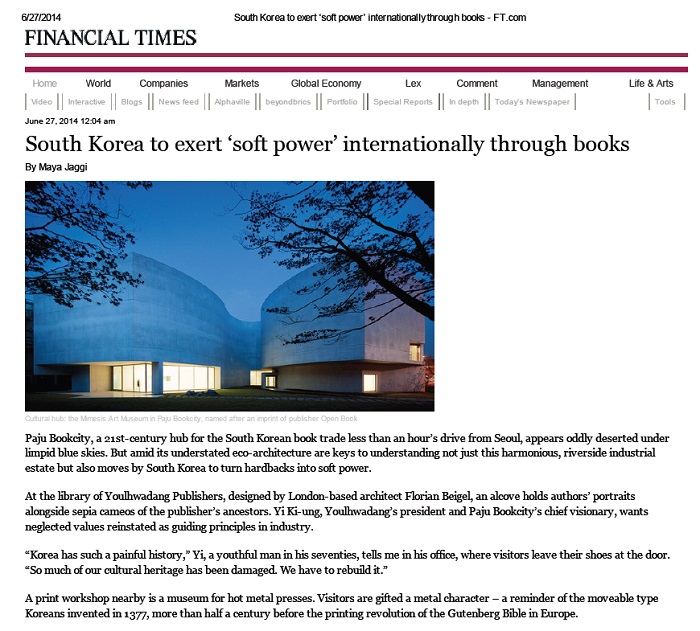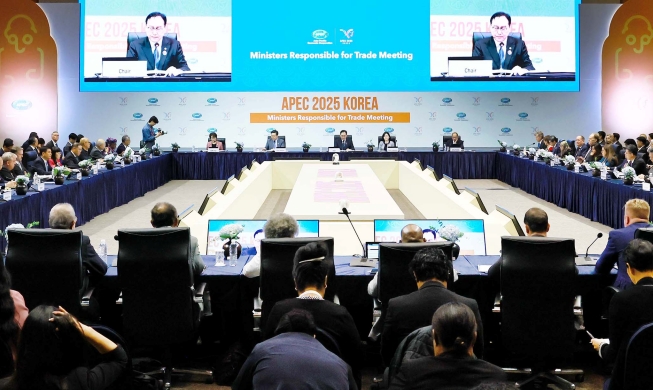“Amid its understated eco-architecture are keys to moves by South Korea to turn hardbacks into soft power.”
These are comments from an article dated July 27 and published in The Financial Times (FT), a British daily, under the title, “South Korea to exert soft power internationally through books.”
The article reported that Korea has expended effort in the establishment and development of “Paju Bookcity” in Gyeonggi-do, (Gyeonggi Province), with the goal of boosting soft power by means of books.

The piece began in calling the city, “a 21st-century hub for the South Korean book trade less than an hour’s drive from Seoul.”
According to Maya Jaggi, who penned the article, “Korea’s long history of the printed word is a source of immense national pride.” She also said, “Paju Bookcity flags a pillar of Korean identity to a world more familiar with K-pop and kimchi (pickled cabbage).”
She described how the city was dreamt up around 1988 by seven publishers, at a time when the government had little interest in investing in books.
We learn that the city, which was once a dirt-cheap swampland, has grown to become the home of some 300 publishers, printers and related businesses that employ about 10,000 people. Also that it is the host city of Asia’s biggest literary festival “Paju Booksori,” attracting 450,000 visitors a year.
While pointing out the government's switch to investing actively in the city, the article mentioned, “This change of heart accords with today’s policy of ‘cultural prosperity.’”
It later brought up hallyu, “The South Korean cultural wave that engulfed East Asia at the turn of the century [in early 2000],” and pointed out that, “It has now woken up to literature’s soft-power potential.”
“The South Korean book industry -- the world’s 10th-largest by number of titles, and supreme in children’s books – is experiencing an export push.”
It also quoted the Minister of Culture, Sports and Tourism, Yoo Jinryong, “There is a fallacy in the west that Korea is only about economic development. We decided that our long history and cultural traditions are important for the world to get to know.”
The article pointed out that the popular TV dramas that began the Korean wave were based on historical novels, and quoted Yoo once again, “For hallyu to be sustainable, we need to create new stories that are entertaining. That’s why we promote literature.”
The article later borrowed words from the ministry, “For a country as small as Korea, boosting economic power and military forces will be of limited success. So pursuing cultural power is a very important goal for us” in arguing that, “Other small Asian powers, including Malaysia, Singapore and Thailand, are watching Seoul’s book strategy keenly.”
It also introduced the Literature Translation Institute of Korea (LTI), a specialized institute for translators that has spearheaded the effort to globalize Korean literature.
“The institute, created by the Ministry of Culture in 2001,” it reported, “has seen its annual budget rise from USD 5 million to 8 million. And more than 100 Korean titles a year are published around the world as a result.”
Among those, two great works were referred to as testament to international successes: First, Shin Kyung-sook’s 2011 Man Asian Literary Prize-winning novel, “Please Look After Mom,” which has been published in 34 countries and became a New York Times bestseller.
Also, it introduced how Hwang Sun-mi’s “The Hen Who Dreamed She Could Fly,” which is a children’s fairy tale, “has also taken off, and its Korean anime spin-off was released in the U.K. in March.”
By Sohn JiAe
Korea.net Staff Writer
jiae5853@korea.kr
These are comments from an article dated July 27 and published in The Financial Times (FT), a British daily, under the title, “South Korea to exert soft power internationally through books.”
The article reported that Korea has expended effort in the establishment and development of “Paju Bookcity” in Gyeonggi-do, (Gyeonggi Province), with the goal of boosting soft power by means of books.

The July 27 Financial Times article, “South Korea to exert soft power internationally through books.”
The piece began in calling the city, “a 21st-century hub for the South Korean book trade less than an hour’s drive from Seoul.”
According to Maya Jaggi, who penned the article, “Korea’s long history of the printed word is a source of immense national pride.” She also said, “Paju Bookcity flags a pillar of Korean identity to a world more familiar with K-pop and kimchi (pickled cabbage).”
She described how the city was dreamt up around 1988 by seven publishers, at a time when the government had little interest in investing in books.
We learn that the city, which was once a dirt-cheap swampland, has grown to become the home of some 300 publishers, printers and related businesses that employ about 10,000 people. Also that it is the host city of Asia’s biggest literary festival “Paju Booksori,” attracting 450,000 visitors a year.
While pointing out the government's switch to investing actively in the city, the article mentioned, “This change of heart accords with today’s policy of ‘cultural prosperity.’”
It later brought up hallyu, “The South Korean cultural wave that engulfed East Asia at the turn of the century [in early 2000],” and pointed out that, “It has now woken up to literature’s soft-power potential.”
“The South Korean book industry -- the world’s 10th-largest by number of titles, and supreme in children’s books – is experiencing an export push.”
It also quoted the Minister of Culture, Sports and Tourism, Yoo Jinryong, “There is a fallacy in the west that Korea is only about economic development. We decided that our long history and cultural traditions are important for the world to get to know.”
The article pointed out that the popular TV dramas that began the Korean wave were based on historical novels, and quoted Yoo once again, “For hallyu to be sustainable, we need to create new stories that are entertaining. That’s why we promote literature.”
The article later borrowed words from the ministry, “For a country as small as Korea, boosting economic power and military forces will be of limited success. So pursuing cultural power is a very important goal for us” in arguing that, “Other small Asian powers, including Malaysia, Singapore and Thailand, are watching Seoul’s book strategy keenly.”
It also introduced the Literature Translation Institute of Korea (LTI), a specialized institute for translators that has spearheaded the effort to globalize Korean literature.
“The institute, created by the Ministry of Culture in 2001,” it reported, “has seen its annual budget rise from USD 5 million to 8 million. And more than 100 Korean titles a year are published around the world as a result.”
Among those, two great works were referred to as testament to international successes: First, Shin Kyung-sook’s 2011 Man Asian Literary Prize-winning novel, “Please Look After Mom,” which has been published in 34 countries and became a New York Times bestseller.
Also, it introduced how Hwang Sun-mi’s “The Hen Who Dreamed She Could Fly,” which is a children’s fairy tale, “has also taken off, and its Korean anime spin-off was released in the U.K. in March.”
By Sohn JiAe
Korea.net Staff Writer
jiae5853@korea.kr
